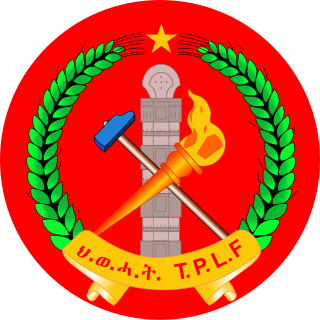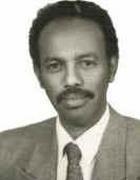Related Research Articles

Eritrea is an ancient name, associated in the past with its Greek form Erythraia, Ἐρυθραία, and its derived Latin form Erythræa. This name relates to that of the Red Sea, then called the Erythræan Sea, from the Greek for "red", ἐρυθρός, erythros. But earlier Eritrea was called Mdre Bahri. The Italians created the colony of Eritrea in the 19th century around Asmara and named it with its current name. After World War II, Eritrea annexed to Ethiopia. Following the communist Ethiopian government's defeat in 1991 by the coalition created by armed groups notably the EPLF, Eritrea declared its independence. Eritrea officially celebrated its 1st anniversary of independence on May 24,1993.

Isaias Afwerki is an Eritrean politician and partisan who has been the first and only president of Eritrea since 1993. In addition to being president, Isaias has been the chairman of Eritrea's sole legal political party, the People's Front for Democracy and Justice (PFDJ).
Berhanu Beyeh is an Ethiopian former military officer and politician. He was the Foreign Minister of Ethiopia during the Derg regime from 1986 to 1989. Prior to that, he was chairman of the Derg's committee for legal affairs. Beyeh was a refugee resident of the Italian Embassy from May 1991 until December 2020, when he left the Embassy.

The Eritrean People's Liberation Front (EPLF), colloquially known as Shabia or HGDEF, was an armed Marxist–Leninist organization that fought for the independence of Eritrea from Ethiopia. It emerged in 1973 as a far-left to left-wing nationalist group that split from the Eritrean Liberation Front (ELF). After achieving Eritrean independence in 1991, it transformed into the People's Front for Democracy and Justice (PFDJ), which serves as Eritrea's sole legal political party.

The Tigray People's Liberation Front, also called the Tigrayan People's Liberation Front, is a left-wing ethnic nationalist, paramilitary group, and the former ruling party of Ethiopia. It was classified as a terrorist organization by the Ethiopian government from May 2021 until its removal from the list in March 2023. In older and less formal texts and speech it is known as Woyane or Weyané.

The Eritrean War of Independence was a war for independence which Eritrean independence fighters waged against successive Ethiopian governments from 1 September 1961 to 24 May 1991.

Petros Solomon is an Eritrean politician. He was an Eritrean People's Liberation Front commander and played a key role during the Eritrean War of Independence, following independence he served in several positions in the Cabinet, including Minister of Defense and Minister of Foreign Affairs.
The Marxist–Leninist League of Tigray (MLLT) was a semi-clandestine Hoxhaist Communist Party that held a leading role in the Tigrayan Peoples' Liberation Front (TPLF) in the 1980s. The majority of the TPLF leadership held dual membership in the MLLT, including Meles Zenawi, Prime Minister of the Federal Democratic Republic of Ethiopia from 1995 until his death in 2012.

The Eritrean Civil Wars were two conflicts that were fought between competing organizations for the liberation of Eritrea.

Ethiopia–Israel relations are foreign relations between Ethiopia and Israel. Both countries re-established diplomatic relations in 1992. Ethiopia has an embassy in Tel Aviv. Israel has an embassy in Addis Ababa.
Tesfaye Dinka Yadessa was an Ethiopian politician who was Minister of Finance (1983–1986), Minister of Foreign Affairs (1989–1991), and Prime Minister of Ethiopia. He was the head of the delegation of the Ethiopian Government during the London Conference of 1991 which aimed to end the Ethiopian Civil War.
The Union of Ethiopian Marxist–Leninist Organizations, known by its Amharic acronym Imaledih or Emaledh, was a coalition of communist organizations in Ethiopia active between 1977 and 1979. Imaledih was intended as a pre-party formation, Imaledih was supposed function as the nucleus of new proletarian party. Through Imaledih, the constituent parties of the coalition would merge. The formation of Imaledih was actively supported by the ruling Derg military junta.
Abyotawit Seded was a communist organization in Ethiopia, formed in 1976 by a group of officers of the Derg military junta who had attended political trainings in the Soviet Union from 1975 and onwards.
The Commission for Organizing the Party of the Working People of Ethiopia, generally known by its English acronym COPWE, was a political organization in Ethiopia during the rule of the Derg. COPWE was a preparty organization; it had the task of preparing the Ethiopian people for creation of a communist party. In the absence of a communist party, COPWE functioned as a temporary replacement of the party that it would create.
Alemu Abebe is an Ethiopian politician. He served as mayor of Addis Ababa during the years of Red Terror.

Oromay is an Amharic-language novel, published in 1983. It was written by Baalu Girma. The novel presents a cynical account on the Red Star Campaign of the Derg military junta. The book was published by the Kuraz Publishing Agency in Addis Ababa. In spite of a government ban on the book, it became widely read and famous. According to Ruth Iyob, the book presents "an accurate and compelling account of the events surrounding the failure of this campaign".
Kjetil Tronvoll is a peace and conflict studies researcher, specialising in Eritrea, Ethiopia and Zanzibar. As of 2021, he is a professor of peace and conflict studies at Bjørknes University College and heads a consultancy firm Oslo Analytica.
Christopher S. Clapham is a British Africanist and political scientist. He studied at Lancaster University and was a senior lecturer in politics (1974–89), and a professor of politics and international relations (1989-2002) there. Since 2002 Clapham is a professor, now emeritus, based at the Centre of African Studies of Cambridge University. He served as the editor of Journal of Modern African Studies from 1997 up to 2012. He was a president to the African Studies Association of the United Kingdom from 1992 to 1994.

The fall of the Derg, also known as Downfall of the Derg, was a military campaign that resulted in the defeat of the ruling Marxist–Leninist military junta, the Derg, by the rebel coalition Ethiopian People's Revolutionary Democratic Front (EPRDF) on 28 May 1991 in Addis Ababa, ending the Ethiopian Civil War. The Derg took power after deposing Emperor Haile Selassie and the Solomonic dynasty, an imperial dynasty of Ethiopia that began in 1270. The Derg suffered from insurgency with different factions, and separatist rebel groups since their early rule, beginning with the Ethiopian Civil War. The 1983–1985 famine, the Red Terror, and resettlement and villagization made the Derg unpopular with the majority of Ethiopians tending to support insurgent groups like the Tigray People's Liberation Front (TPLF) and Eritrean People's Liberation Front (EPLF).

The following events detail foreign affairs dominated by Ethiopian Prime Minister Meles Zenawi from his presidency until his death in 2012.
References
- 1 2 Pateman, Roy. Eritrea: Even the Stones Are Burning . Lawrenceville, NJ [u.a.]: Red Sea Press, 1998. p. 19
- 1 2 3 Clapham Christopher. Transformation and Continuity in Revolutionary Ethiopia . Cambridge: Cambridge University Press, 1988. p. 224
- 1 2 National Economic Association. 2006 Election of Officers - Nominees Archived September 20, 2006, at the Wayback Machine
- 1 2 Middle East Economic Digest . London: Middle East Economic Digest, etc.], 1977. p. 18
- ↑ Central Asian Research Centre (London, England), and Russia-Asia Research Centre. USSR and Third World , Volume 6. London: Central Asian Research Centre], 1976. p. 162
- 1 2 Clapham Christopher. Transformation and Continuity in Revolutionary Ethiopia . Cambridge: Cambridge University Press, 1988. p. 83
- 1 2 Haile-Selassie, Teferra. The Ethiopian Revolution, 1974-1991: From a Monarchical Autocracy to a Military Oligarchy . London [u.a.]: Kegan Paul Internat, 1997. p. 293
- ↑ Fontrier, Marc. La chute de la junte militaire ethiopienne: (1987 - 1991) : chroniques de la Republique Populaire et Democratique d'Ethiopie . Paris [u.a.]: L' Harmattan, 1999. pp. 453-454
- ↑ AP Images. Former President Jimmy Carter tells a news conference that peace talks between delegations headed by Alamin Mohamed Saiyed, left, of the Eritrean People's Liberation Front and Ashegre Yigletu, right, of the Worker's Party of Ethiopia will be resumed in November in Nairobi, Kenya, at the Carter Presidential Center in Atlanta, Sept. 19, 1989. (AP Photo/Charles Kelly)
- ↑ New African . London: IC Magazines Ltd.], 1990. p. 9
- ↑ The Weekly Review . Nairobi: Stellascope Ltd.], 1989. p. 199
- ↑ countrystudies.us. [Regime Stability and Peace Negotiations]
- ↑ Iyob, Ruth. The Eritrean Struggle for Independence: Domination, Resistance, Nationalism, 1941-1993 . Cambridge [England]: Cambridge University Press, 1997. p. 175
- ↑ United States. AF Press Clips . Washington, D.C.: Bureau of African Affairs, Dept. of State, U.S.A., 1991. p. 182
- ↑ Baton Rouge Center For World Affairs, INC. BRCWA Board of Directors Archived January 21, 2012, at the Wayback Machine